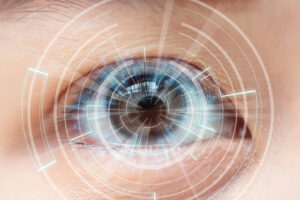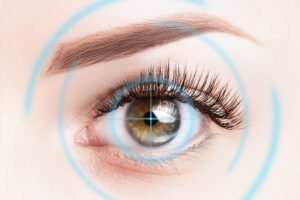
Just as our physical strength decreases with age, our eyes also exhibit an age-related decline in performance — particularly as we reach our 60s and beyond.
Some age-related eye changes, such as presbyopia, are perfectly normal and don’t signify any sort of disease process. While cataracts can be considered an age-related disease, they are extremely common among seniors.
Some of us, however, will experience more serious age-related eye diseases that have greater potential for affecting our quality of life as we grow older. These conditions include glaucoma, macular degeneration, and diabetic retinopathy.
When Do Age-Related Vision Changes Occur?
Presbyopia.
After you pass the milestone age of 40, you’ll notice it’s more difficult to focus on objects up close because of presbyopia. This is a perfectly normal loss of focusing ability due to hardening of the lens inside your eye.
For a time, you can compensate for this gradual decline in focusing ability by holding reading material farther away from your eyes. But eventually, you will need reading glasses, progressive lenses or multifocal contact lenses.
Some corrective surgery options for presbyopia also are available, such as corneal inlays, monovision LASIK, conductive keratoplasty and refractive lens exchange.
As you continue to age through your 50s and beyond, presbyopia becomes more advanced. You may notice the need for more frequent changes in eyeglass or contact lens prescriptions. You may also find that a single prescription is no longer the best solution for all your visual needs. As an example, you may need one pair of eyeglasses for normal tasks and another that emphasizes intermediate ranges for working more comfortably at the computer.
Cataracts.
Even though cataracts are considered an age-related eye disease, they are so common among seniors that they can also be classified as a normal aging change.
According to Mayo Clinic, about half of all 65-year-old Americans have some degree of cataract formation in their eyes. As you enter your 70s, the percentage is even higher. It’s estimated that by 2020 more than 30 million Americans will have cataracts.
Thankfully, modern cataract surgery is extremely safe and so effective that 100 percent of vision lost to cataract formation usually is restored. If you are noticing vision changes due to cataracts, don’t hesitate to discuss symptoms with your eye doctor. It’s often better to have cataracts removed before they advance too far.
How Aging Affects Other Eye Structures
Just like there isn’t one type of health but six different dimensions of it, there’s no one singular change related to old age that affects eye health. While normally we think of aging as it relates to conditions such as presbyopia and cataracts, more subtle changes in our vision and eye structures also take place as we grow older. These changes include:
Reduced pupil size. As we age, muscles that control our pupil size and reaction to light lose some strength. This causes the pupil to become smaller and less responsive to changes in ambient lighting.
Because of these changes, people in their 60s need three times more ambient light for comfortable reading than those in their 20s.
Also, seniors are more likely to be dazzled by bright sunlight and glare when emerging from a dimly lit building such as a movie theater. Eyeglasses with photochromic lenses and anti-reflective coating can help reduce this problem.
Dry eyes. As we age, our bodies produce fewer tears. This is particularly true for women after menopause. If you begin to experience a burning sensation, stinging, or other eye discomfort related to dry eyes, use artificial tears as needed throughout the day for comfort, or consult your eye doctor for other options such as prescription dry eye medications. LASIK Surgery Center in Atlanta is one of our best-known centres.
Contact Us
If you have more questions about LASIK procedures, get in touch with us.
Related Blogs

Timing is Everything: When to Consider LASIK After Nursing for Optimal Results
Timing is everything when considering LASIK eye surgery after nursing, and understanding the optimal period for this procedure is vital for both mother and baby.

Cataract Surgery: Restoring Clarity and Confidence
Cataract surgery is a transformative procedure that offers a new lease on clear vision and renewed confidence. As cataracts cloud the eye’s lens, causing blurred

Intralase LASIK Explained: What to Expect Before, During, and After the Procedure
Intralase LASIK is a cutting-edge procedure that offers a safe, effective, and precise way to enhance vision compared to traditional LASIK methods. Understanding what to
